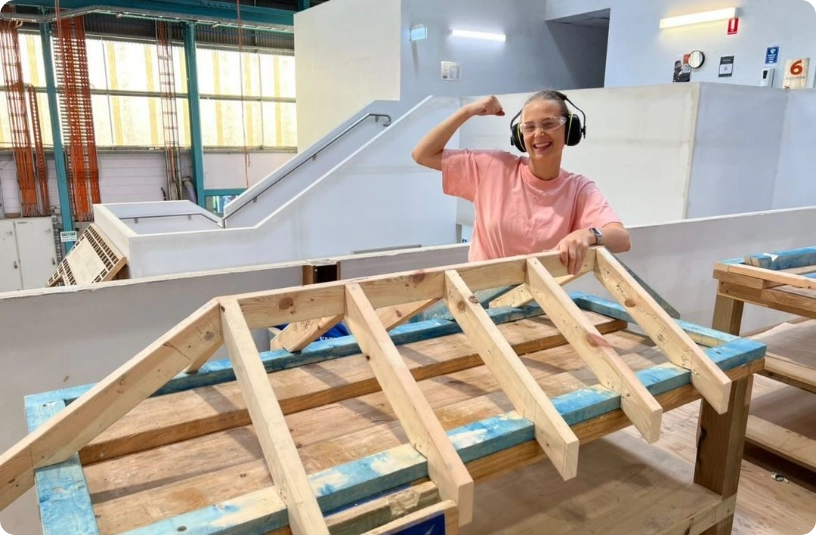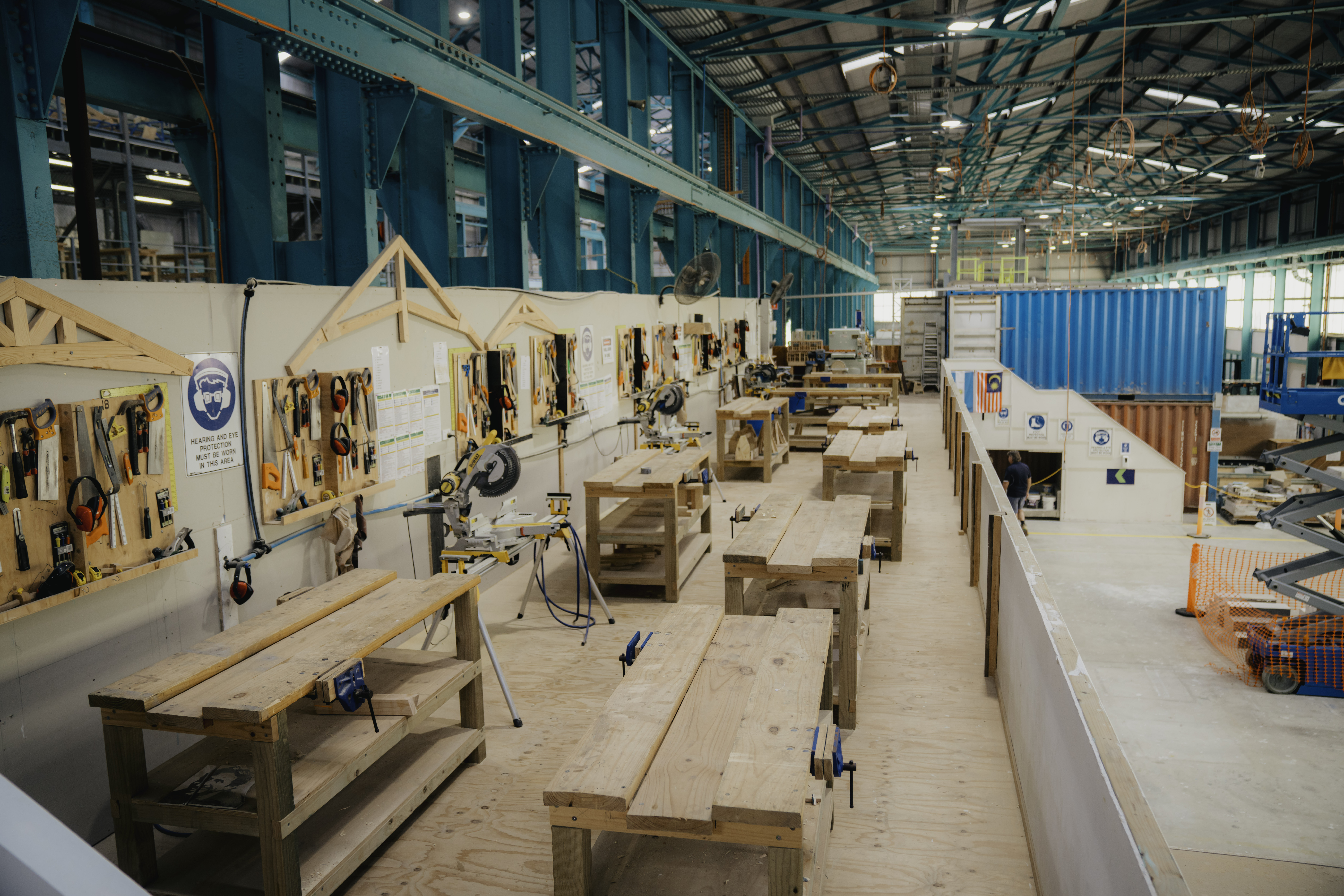Embark on a journey into the world of carpentry with our comprehensive guide on how to become a carpenter!
Gain insights into the role and scope of carpentry, discover its benefits and opportunities, and cultivate essential skills. Immerse yourself in research, master basic techniques, and acquire the necessary tools and safety gear.
Enrol in a builders licence course (such as CPC40120 Certificate IV in Building and Construction) or gain hands-on experience through apprenticeships or internships and explore specialised techniques.
Establish your professional identity with a builders licence WA along with an impressive portfolio and resume. Connect and network within the industry to expand your opportunities. Finally, embrace continuous learning, follow your passion, and unleash the immense potential of building and construction.
Introduction to carpentry
Understanding the role and scope of carpentry
Carpentry is the art of crafting and constructing wooden structures, ranging from residential houses to commercial buildings.
As a carpenter, your expertise will be instrumental in various stages of construction, including framing, roofing, flooring, and finishing work. You will work closely with other tradespeople and professionals to ensure the structural integrity and aesthetic appeal of the final product.
Exploring the benefits and opportunities in carpentry
Embarking on a career in carpentry offers a multitude of benefits and opportunities. Firstly, it allows you to showcase your creativity and craftsmanship by transforming raw materials into functional and visually appealing structures. Additionally, carpentry provides a sense of fulfilment as you witness your work taking shape and becoming an integral part of people’s lives.
Moreover, the demand for skilled carpenters remains steady, presenting ample opportunities for employment and entrepreneurial ventures.
Essential skills and qualities for a carpenter
To thrive as a carpenter, certain skills and qualities are paramount. Precision and attention to detail are essential to ensure accurate measurements and precise cuts. Problem-solving skills enable you to overcome challenges that may arise during construction.
Patience and perseverance are vital traits, as carpentry often requires repetitive tasks and meticulous craftsmanship. Effective communication and teamwork skills are also crucial, as you will collaborate with other professionals and tradespeople.
💡KEY TAKEAWAY: Understanding the role and scope of carpentry, exploring its benefits and opportunities, and cultivating the essential skills and qualities required are crucial steps towards embarking on a successful journey in building and construction.
Getting started in carpentry
Researching and familiarising yourself with carpentry
Begin by immersing yourself in the world of carpentry through research and exploration.
Read books, browse reputable websites, and seek out experienced carpenters who can offer valuable insights. Familiarise yourself with the different types of carpentry, such as rough carpentry and finish carpentry, and understand the diverse applications within the field. This knowledge will provide a solid foundation as you progress in your carpentry endeavours.
Building a strong foundation in basic carpentry techniques
Mastering basic carpentry techniques is crucial for honing your skills and building confidence. Start by learning fundamental skills like measuring, marking, and cutting accurately. Familiarise yourself with tools such as saws, hammers, and chisels, and practice using them effectively.
Additionally, acquire knowledge of joinery techniques, including butt joints, lap joints, and mortise and tenon joints. By focusing on these foundational skills, you will develop a solid understanding of carpentry principles.
Equipping yourself with essential tools and safety gear
Investing in the right tools and safety gear is essential for any aspiring carpenter. Begin with the basics, such as a measuring tape, level, and claw hammer. As you progress, expand your tool collection to include power tools like a circular saw and a cordless drill.
Remember to prioritise safety by obtaining protective gear, such as safety glasses, gloves, and ear protection. Having the right equipment will not only enhance your efficiency but also ensure a safe working environment.
💡KEY TAKEAWAY: Researching carpentry, building a foundation in basic techniques, and acquiring essential tools and safety gear are crucial steps in starting your journey as a carpenter. Embrace continuous learning and practice to enhance your skills and unlock the vast potential of carpentry.
Developing your carpentry knowledge
Enrolling in carpentry training programs and courses
When it comes to developing your carpentry knowledge, enrolling in carpentry training programs and courses is a crucial step in your journey. These educational opportunities provide you with a solid foundation and a comprehensive understanding of the carpentry trade. Look for reputable programs that offer a well-rounded curriculum that covers both theoretical knowledge and practical skills.
By immersing yourself in a carpentry training program, you will gain insights into essential topics such as blueprint reading, measurement techniques, material selection, and safety protocols. These programs often include hands-on workshops and demonstrations, allowing you to apply your learning in a real-world setting.
Expanding your expertise with specialised carpentry techniques
To truly excel in carpentry, it’s essential to expand your expertise with specialised carpentry techniques. This involves exploring niche areas within the field that align with your interests and career goals. Consider areas such as finish carpentry, cabinetry, timber framing, or restoration work.
Specialised techniques require additional learning and practice, so seek out resources such as books, online tutorials, and workshops that focus on these specific areas. Engage with experienced professionals in your chosen niche, attend industry conferences or trade shows, and network with like-minded individuals.
💡KEY TAKEAWAY: Developing your carpentry knowledge requires a combination of formal education, practical experience, and specialised techniques. By enrolling in carpentry training programs, gaining hands-on experience through apprenticeships or internships, and expanding your expertise in niche areas, you will establish a solid foundation and become a well-rounded carpenter capable of tackling diverse projects with confidence.
Establishing yourself as a professional carpenter
Crafting an impressive carpentry portfolio and resume
When it comes to establishing yourself as a professional carpenter, one crucial aspect is crafting an impressive carpentry portfolio and resume. Your portfolio serves as a visual representation of your skills, expertise, and quality of work. Start by including high-resolution photographs of your completed projects, showcasing the variety of carpentry techniques you’ve mastered.
Whether it’s intricate cabinetry, beautiful wooden furniture, or structural elements, your portfolio should highlight your versatility and attention to detail. Remember to include a brief description of each project, outlining the challenges you faced and the solutions you implemented.
Additionally, your resume should provide a comprehensive overview of your experience and qualifications as a carpenter. Include your formal education, relevant certifications, and any specialised training you’ve undergone.
Highlight your key skills, such as precision cutting, joinery, and knowledge of different wood types. If you have any notable achievements or awards, be sure to mention them as well. It’s also beneficial to outline your involvement in any industry organisations or associations.
Networking and building connections within the carpentry industry
Networking and building connections within the carpentry industry are essential for professional growth and opportunities. Attend trade shows, conferences, and industry events to connect with fellow carpenters, contractors, and suppliers. Engage in conversations, share your experiences, and be genuinely interested in others’ work.
These events provide an excellent platform to exchange ideas, gain insights into emerging trends, and forge valuable professional relationships.
Furthermore, join online forums and communities dedicated to carpentry. Participate actively by offering advice, sharing your expertise, and asking questions. Networking through digital platforms allows you to connect with professionals from around the world, expanding your knowledge and broadening your perspectives.
Nurturing a strong work ethic and professional reputation
To establish yourself as a professional carpenter, nurturing a strong work ethic and building a reputable image are paramount. Dedicate yourself to delivering quality craftsmanship on every project, paying meticulous attention to detail, and meeting deadlines. Strive for excellence in every aspect of your work, from the initial planning and design stages to the final touches.
Maintain professionalism in all your interactions, whether it’s with clients, fellow carpenters, or suppliers. Be punctual, respectful, and responsive to inquiries or concerns. Communicate clearly and effectively, ensuring that everyone involved in the project is on the same page.
Upholding a strong work ethic and professional reputation also involves continuous learning and staying up-to-date with industry advancements. Embrace new technologies, tools, and techniques to enhance your skills and improve efficiency. Actively seek feedback and learn from constructive criticism to refine your abilities further.
💡KEY TAKEAWAY: Crafting an impressive portfolio and resume, networking within the industry, and nurturing a strong work ethic are key factors in establishing yourself as a professional carpenter. By showcasing your skills through a well-curated portfolio, actively engaging with industry professionals, and consistently delivering high-quality work, you can build a solid foundation for a successful career in carpentry.
Advancing your carpentry career
Exploring niche areas and specialisations in carpentry
When it comes to advancing your carpentry career, one effective strategy is to explore niche areas and specialisations within the field. Carpentry encompasses a wide range of disciplines, each offering unique opportunities for growth and expertise. By delving into these specialised areas, you can carve out a distinctive niche for yourself and expand your skill set.
Consider investigating architectural woodworking, where you can focus on crafting intricate and ornamental woodwork for high-end residential or commercial projects. This niche requires meticulous attention to detail and a deep understanding of design principles.
Alternatively, you might explore timber framing, an ancient technique that involves constructing structures using large, exposed wooden beams and joinery. This specialised skill requires a profound understanding of structural integrity and traditional craftsmanship.
Pursuing continuing education and advanced training opportunities
To truly excel in your carpentry career, it is essential to pursue continuing education and seek out advanced training opportunities. The construction industry is constantly evolving, with new materials, techniques, and technologies emerging regularly.
Look for specialised workshops, seminars, or trade shows that focus on advancements in carpentry and construction. These events provide valuable networking opportunities and access to industry experts who can share their knowledge and experiences.
Additionally, consider enrolling in courses or certification programs offered by reputable institutions or trade organisations. These educational opportunities can deepen your understanding of specialised topics, such as sustainable building practices or cutting-edge construction methods.
Entrepreneurship: starting your own carpentry business or freelancing
For those who aspire to not only learn how to become a carpenter but also take their carpentry career to the next level, entrepreneurship offers an exciting path forward. Starting your own carpentry business or pursuing freelancing opportunities allows you to showcase your unique skills, build a reputation, and have greater control over your professional destiny.
Before embarking on this entrepreneurial journey, conduct thorough market research and develop a comprehensive business plan. Identify your target market, define your services, and establish a competitive pricing structure. Building a strong network of potential clients and industry contacts is crucial for securing projects and establishing a solid foundation for your business.
💡KEY TAKEAWAY: By exploring niche areas, pursuing continuing education, and considering entrepreneurship, you can advance your carpentry career to new heights. Embrace the opportunities to specialise, expand your knowledge, and take control of your professional path. With dedication and a passion for craftsmanship, you can become a respected authority in the ever-evolving world of carpentry.
At Everthought, we empower individuals like you to unlock their construction potential. As a leading education provider in the industry, we offer cutting-edge programs, deliver industry-relevant skills, and cultivate a supportive learning environment.












